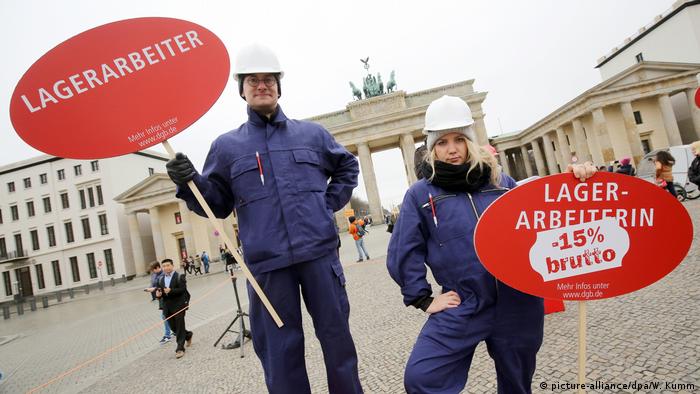Two days of labour Ministers of the twenty most important industrialised and emerging countries on global chains and gender equity in the delivery advice. There is still much to do, so the Federal Minister Andrea Nahles.

Germany’s catching up to corporations to responsibility for conditions in their suppliers, Federal labour Minister Andrea Nahles on the sidelines of a meeting with colleagues from the twenty most powerful industrial and emerging countries (G20) in Bad Neuenahr for dangerous work.
“In the topic of supply chains, for example, the British and the French adopted already laws to prevent slave labour, in order to implement human rights work,” said Nahles in an Interview with Deutsche Welle. “I would wish for something like that in Germany.”
So far, only a plan of action
The Grand coalition has addressed the issue so far only with a plan of action; on a legal provision, they could not agree. With your desire for a law Nahles prior to the German election in line with the Green party and the Left. So Niema Movassat called, for example, the expert for economic cooperation of the Left, legal, environmental, social and labour standards for global companies.

2013 killed at least 70 people in the collapse of a textile factory in Bangladesh
Again and again the precarious working conditions in factories in developing and emerging countries, the large corporations from industrialized countries are supplying excite, stir in the Public. The German fashion discounter KiK, for example, repeatedly in the criticism. In 2012, died in a fire in a textile factory that supplied, among other things, KiK, 260 workers.
The Federal government is involved as a donor of the so-called “Vision Zero Fund” against dangerous working conditions in developing countries. The project was initiated in 2016 by Germany during its presidency of the G7, a group of seven Western industrial countries. The aim is to reduce the number of fatal accidents down to Zero. At the conclusion of the two-day Ministerial conference in Bad Neuenahr, Nahles said, the Budget of the Fund should be further increased werdes. The Non-G20 country of Norway wool the equivalent of a Deposit of approximately 320 000 Euro, and a further three to four countries have also said money. Germany had said recently, in addition to two million euros. So far, the Fund has about 7.5 million euros.
Problem Of Gender Pay Gap

15% less For the same pay of men and women in Germany is only in midfield
In terms of gender justice in Germany is still much to do, so the Minister. The Gender Pay Gap, the difference between the pay of women and men who do the same Job, location Germany in comparison with other G20 countries, and only in the midfield. In addition, each G20 country has to work through “a whole series of tasks” to end the discrimination of women in the labour market.
International model of the German training and the dual System, the combination of vocational school and practice, will be appreciated “internationally,” said Nahles.
Preparation for Hamburg
Germany currently has the presidency of the G20. On 7. and 8. In July, the heads of state and government come together, the heads of the member States in Hamburg. In preparation for the conference, the trade Ministers of the member States met to develop a programme that can be decided in Hamburg.
Video 12:03 Share
Bangladesh: garment workers fight back
Send Facebook Twitter google+ Tumblr VZ Mr. Wong Xing, Webnews Yigg Newsvine Digg
Permalink : http://p.dw.com/p/2cW5F
Bangladesh: garment workers fight back
Thematic priorities of the Ministers ‘ meeting in Bad Neuenahr goods in addition to fair working conditions along the international chains and gender justice delivery, the future of work in the digital world and the Integration of migrants and refugees in the labour market.
You should not just Foreign and interior Ministers left the issue of Migration, so Nahles. Finally, work is of Central importance for the Integration of immigrants and refugees.
Focus: Informal Work
At the conclusion of the two-day meeting, the Minister of labour Nahles joined together with their colleagues, Yi Weimin from China and Jorge Arberto Triaca from Argentina in front of the press. China was last year’s host of the G20 summit, Tricias home country will apply by the end of 2017, the presidency of the Federal Republic of Germany. The Minister said that Argentina wanted to play with in the coming year, a focus on combating informal employment relationships. In many Emerging and developing countries, people work without a fixed contract and thus without access to workplace health insurance or a pension Fund. Especially people from poorer backgrounds and women are affected.